A chat with Brian Duffy
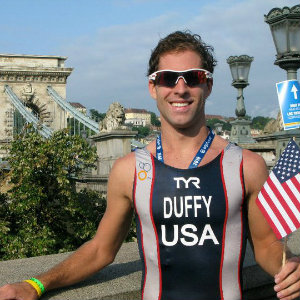
Brian Duffy Jr. has been knocking at the door of an amateur national championship for several years. He finally took the crown this year on his fifth attempt. Although Brian is by definition the fastest amateur in the sport, he’s turning professional in another career.
Slowtwitch: Congrats on becoming a National Champion.
Brian Duffy: Thank you! I am thrilled to have won and to be a national champion. Ever since I first competed in the Age-Group National Championships in 2008, at the age of 20, I have aspired to winning this race. It is an event that has humbled me many times, which has made the victory that much more sweet! I am honored to have won the championship event, especially since it is put on by our sport’s governing body. Everything came together this past weekend in Burlington and I executed the race how I had hoped.
ST: A glance at past results show you’ve done well at this race.
Brian: I have competed in this race five times and have done well, but never felt I reached my potential until this year. For the last few years I entered the race with the goal to win and came close, finishing fourth in 2010 and second in 2011 — so it’s nice to have finally pulled through!
ST: Is it safe to say you knew what you were in for and who you were up against?
Brian: For the most part, yes. It’s fun to compete against most of the same athletes at various big races on the circuit. However, I will say, in contrast to a few years ago, with the growth of the sport there are more and more elite athletes that kind of come out of nowhere. Many are former collegiate athletes. So you can never be too sure. But the athletes I targeted as my main competition all finished in the top few places, so things played out as I expected. Adam Webber, who finished fourth and who is the reigning USAT athlete of the year, is a close friend and an athlete who I race against often. In fact, we will race five times this year. He whooped my butt in a local beach sprint triathlon a few weeks ago! I knew he would be tough to beat, and I expected Drew Scott and Dan Hedgecock to be in contention as well.
ST: When did you know the race was yours to lose?
Brian: Given that all of the athletes are interspersed among various waves, this race is unique in that it’s very difficult to gauge your overall standing. Leaving transition two, I was essentially tied for the lead with Drew Scott and Adam Webber. As I started to run, my legs felt good and I knew at this point a victory was within reach. I had a surge of adrenaline realizing I could be a national champion. The last mile hurt (bad cramping), and seemed to last forever, but I crossed victorious in 1:53. After crossing the finish line, I wish I could have celebrated a bit more, but I maintained caution until official results were released, as you can never be too sure of your placing in this wave format. I was also immediately escorted into the drug testing tent, so didn’t really have an opportunity to talk to anyone for over an hour after I finished!
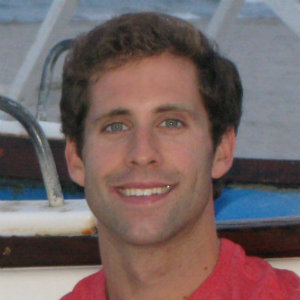
ST: Do you think the course required a well rounded skill set?
Brian: I do. I enjoyed the course and felt it demanded a versatile athlete to prevail. There were some decently-sized swells to navigate during the swim, the bike blended flat sections, rollers, and wind, and the run had a brutal hill at the start. I thought the course was challenging but fair. USAT did an excellent job in preparing the venue and making sure that the race went smoothly.
ST: Were you impressed by the high level of competition at this race?
Brian: With the growth of different Olympic distance series, such as Toyota Cup, 5150, and Rev 3, there has been a dilution of elite amateur talent at any one big race. Having a national championship hosted by the sport’s governing body brings together the top amateur athletes from around the country into one venue. I love to challenge myself against my peers, and Age-Group Nationals is a fantastic opportunity to do so.
ST: What’s your athletic background like?
Brian: During my earlier years, I competed as a club swimmer, but then made running my primary focus throughout high school. It was in freshman year of high school (2003), that I discovered triathlon after reading Lance Armstrong’s first book. I did my first multi-sport race on an old hybrid bike, and was immediately hooked. I continued to do triathlon during the summers while I trained for the running seasons. As I started to place more of an emphasis on triathlon, I hopped back in the pool and was able to build off the swimming foundation I set in my youth.
ST: Did you compete in a sport at college?
Brian: I competed on the cross country and track teams at Duke University for my freshman year. But here’s a funny story. In 2007 I qualified for the Age-Group Sprint Triathlon World Championships in Hamburg, Germany. The race took place in the beginning of my sophomore year, but my parents and I felt it was too amazing an opportunity to pass up. I cleared the race with my professors, but for missing a few days of cross country training camp, I was booted from the team! Especially ironic since I ended up winning overall! It was a blessing in disguise though; as I then realized triathlon was my true passion, and went on to found the Duke Triathlon Club. The club was a great experience. I loved managing the club from an organizational standpoint: going through the university approval stages, recruiting members, setting up schedules, reserving facilities, organizing team events, managing the finances, etc. It also allowed me an opportunity to give back to the community and to teach novice triathletes.
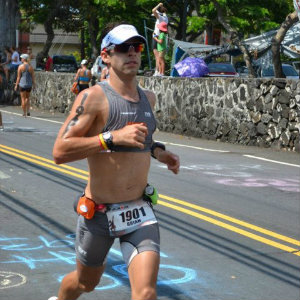
ST: What were some of the elite races you’ve done in the past?
Brian: I won the 2007 AG World Sprint Championship in Hamburg, and was runner-up in the 20-24 age-group at the 2010 Olympic Distance World Championship in Budapest. I’ve also been the overall winner at the Nation’s Triathlon, and have won the elite amateur division at Best of the US Championship, Toyota US Open Championship, Columbia, Philadelphia Insurance, New York City, DC 5150, and others.
In 2011 I did my first Ironman (Kona). I qualified through a 70.3. I finished 5th in my age-group but had serious stomach and back problems during the bike. I vomited throughout, and was unable to take in most nutrition during the entire race. Despite nearly dropping out during the bike due to headaches, fatigue, and back pain, I managed to put together a 2:58 marathon. I’ve learned a tremendous amount from my first Ironman experience, and am returning to Kona this year.
ST: You must have great support from your team, friends and sponsors to help you achieve those results.
Brian: Absolutely! Without the help of my supporters, I would never have made it this far. My parents of course have done so much. They have been by my side throughout my 10 years of racing. My father has been to all but two of my triathlon races in my career—and I’ve raced in about 70 events! I also consider him my manager, as he figures out most of the travel and planning logistics for big races, which is a huge relief to me! My mother has gone to nearly all of my races as well, and is my most emphatic cheerleader!
My coach Eric Bean of Fast Forward Triathlon, who I have worked with for nearly three years, has been instrumental in my development. He’s brought me to new levels in my performance and has shared with me a great deal of insight (even though he’s a UNC fan!). I’d also like to thank CompuTrainer. Using the CompuTrainer has taught me how to hurt! I do most of my riding on the CompuTrainer and I continue to see huge improvements in my power and fitness. A big thank you as well to First Endurance, Inside Out Sports, Rudy Project, CEP Socks and locally to Shannon Grady of Go! Athletics for physiological testing and massage therapy, to Pete Lee of the Malvern Swim Association for re-building my swim over the past five years, and of course to the Philadelphia Triathlon Club for all of their support! Thank you as well to close friends and training partners, Chris McHugh and Dave Cox.
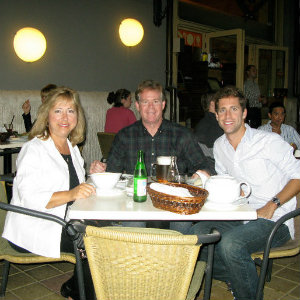
ST: So I guess the big question is will, you take a pro card?
Brian: No! Not in the near future, at least. This is a frequently asked question and one that people tend to have strong opinions on, for whatever reason. My view is that I do the sport for fun, for the experiences, and for the people! I do not consider triathlon my "profession," nor view it as a source of income. In balancing a full-time job in financial services with other responsibilities, I only have time to train about 10 hours a week, which is more of a part-time hobby. I don’t have the time to devote to the sport to really consider myself a professional.
I love the experiences: I cannot wait to compete at the AG World Championships in London next year! I have about 25 friends who are also competing and its events like these that bring together the multi-sport community and create long-lasting memories. I may have the talent to hold my own on the professional level, but until I have more time to dedicate myself to it, I don’t find it appropriate to take that step, and I don’t want to risk jeopardizing the fun, passion, and experiences the sport has given me. I’ve also yet to win the overall amateur at a 70.3 or Ironman race, so there still much room for improvement!
ST: What distance do you most enjoy competing at?
Brian:: Olympic distance! I’m a young, aggressive racer and the Olympic distance includes the elements that stimulate me. Although I may have the most potential at the Ironman distance, after this year I’m going to wait a few years to re-visit long-course. The Olympic distance combines tactics, speed, and aggression, and has more of a racing feel.
Brian blogs here; http://bdufftri.blogspot.com/


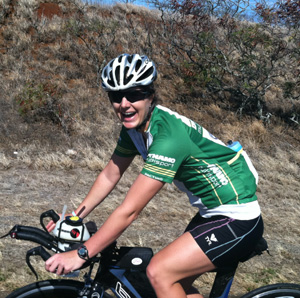
Start the discussion at slowtwitch.northend.network